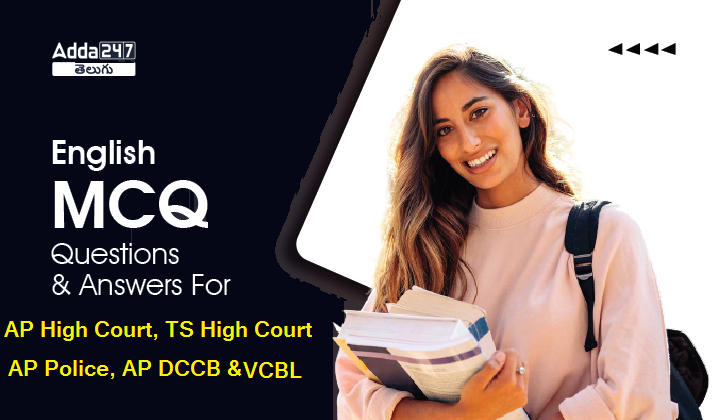English MCQs Questions And Answers: English is one of the most important scoring subjects for all TS And AP State level exams like APPSC Group 1,2,3, and 4, AP High Court and AP District Court, AP Police Constable & SI etc. In this article we are providing English MCQs Questions and answers, these MCQs questions and answers will definitely helps in your success.
English MCQs Questions And Answers: ఆంధ్రప్రదేశ్ మరియు తెలంగాణ లో అత్యంత ముఖ్యమైన మరియు ప్రతిష్టాత్మకమైన పరీక్షలు పోలీస్ మరియు గ్రూప్-1,2,3 అలాగే UPSC లలోనికి చాలా మంది ఆశావహులు ఈ ప్రతిష్టాత్మక ఉద్యోగాల్లో కి ప్రవేశించడానికి ఆసక్తి చూపుతారు.దీనికి పోటీ ఎక్కువగా ఉండడం కారణంగా, అధిక వెయిటేజీ సంబంధిత సబ్జెక్టులను ఎంచుకుని స్మార్ట్ అధ్యయనంతో ఉద్యోగం పొందవచ్చు. ఈ పరీక్షలలో ముఖ్యమైన అంశాలు అయిన పౌర శాస్త్రం , చరిత్ర , భూగోళశాస్త్రం, ఆర్ధిక శాస్త్రం, సైన్సు మరియు విజ్ఞానం, సమకాలీన అంశాలు చాల ముఖ్యమైన పాత్ర పోషిస్తాయి. కాబట్టి Adda247, ఈ అంశాలకి సంబంధించిన కొన్ని ముఖ్యమైన ప్రశ్నలను మీకు అందిస్తుంది. ఈ పరీక్షలపై ఆసక్తి ఉన్న అభ్యర్థులు దిగువ ఉన్న ప్రశ్నలను పరిశీలించండి.
 APPSC/TSPSC Sure shot Selection Group
APPSC/TSPSC Sure shot Selection Group
English MCQs Questions And Answers
English-Questions
Directions (1-5): The following question consists of a passage in which certain phrase/Sentences are printed in bold. Find out if there is an error in any of the bold part of the sentence, find the correct alternatives to replace those parts from the three options given below each question to make the sentence grammatically correct. If the given sentence is grammatically correct or does not require any correction, choose (e), i.e., “No correction required” as your answer.
Free and compulsory education of children in the 6 to 14 age group in India (1) become a fundamental right when, in 2002, Article 21-A was inserted in the 86th Amendment to the Constitution. This right was to be governed by law, as the state may determine, and the enforcing legislation for this came eight years later, as the Right of Children to Free and Compulsory Education (RTE) Act, 2010, or the RTE Act.
(2) With examples from all around hundred countries which having various and similar pieces of legislation or regulations already in place, there were practices drawn from similar experiences. (3) Since its enactment, the RTE Act has been lauded and disparaged. But there has been a concern not only over its provisions but also about the lacunae in the school education system. However, there are clauses in the Act (4) which has enormous catalytic potential but it have gone largely untouched and unnoticed. A focus on three of these provisions can result in an immediate and discernible impact.
The RTE Act is a game-changer in that it establishes that the onus to ensure free and compulsory education lies on the state. (5) However, the ‘compulsory’ and ‘state liability’ part needs to be imbibed by the educational bureaucracy, which is now lacking.
Q1.
- Will become a fundamental right
- became a fundamental right
III. have became a fundamental right
(a) Only I
(b) Only II
(c) Only III
(d) Only I and II
(e) No correction required
Q2.
- having example from over a hundred countries having various
- With examples over a hundred of the countries having a various
III. With examples from over a hundred countries having various
(a) Only I
(b) Only II
(c) Only III
(d) Only I and II
(e) No correction required
Q3.
- Since its enactment, the RTE Act been lauded and
- Since their enactment, the RTE Act have been lauded and
III. Since its enactment, the RTE Act will been lauded and
(a) Only I
(b) Only II
(c) Only III
(d) Only I and II
(e) No correction required
Q4.
- which had enormous catalytic potential though it
- which must be having enormous catalytic potential but should
III. which have enormous catalytic potential but that
(a) Only I
(b) Only II
(c) Only III
(d) Only I and II
(e) No correction required
Q5.
- However, the ‘compulsory’ and ‘state liability’ part needs for be imbibe by the educational bureaucracy, which is
- However, the ‘compulsory’ and ‘state liability’ part needed to be imbibed by the educational bureaucracy, which is then
III. Though, the ‘compulsory’ and ‘state liability’ are the part needs to be imbibed by the educational bureaucracy, which are in turn
(a) Only I
(b) Only II
(c) Only III
(d) Only I and II
(e) No correction required
Directions (6-10): Which of the phrases (a), (b), (c) and (d) given below each statement should replace the phrase printed in bold in the sentence to make it grammatically correct. If the sentence is correct as it is given and No correction is required, mark (e) as the answer.
Q6. Soon after the Tsunami had killed thousands of people along the coasts of southern India, Parliament passes a bill that proposed to set up an institutional mechanism to respond promptly to natural disasters.
(a) passed a bill that proposed
(b) passes a bill with proposed
(c) pass a bill proposing
(d) passed a bill which propose
(e) No correction required
Q7. Denial of wages forced scientists and teachers at the agriculture universities throughout the country to go on strike, crippling crucial research that could help the state of agriculture in the country.
(a) from going on strike
(b) which went on strike
(c) on going for a strike
(d) for going to strike
(e) No correction required
Q8. In an attempt to boost their profits many edible oil producing companies have been engaging themselves in propagandas against commonly used oils and promoting exotic and expensive varieties of oils as more healthier options.
(a) as most healthiest options
(b) as less healthy option
(c) as healthier option
(d) as must healthiest option
(e) No correction required
Q9. Thanks to numerous government initiatives, rural masses which was earlier unaware of the luxuries of urban ways of living are now connected to the same lifestyle.
(a) who was earlier unaware
(b) which were earlier aware
(c) who were earlier conversant
(d) who were earlier unaware
(e) No correction required
Q10. Over the last few months, while most industries are busy in restructuring operations, cutting costs and firing, the Indian pharmaceutical and healthcare industry was adding manpower and given salary hikes.
(a) as many industries are
(b) while most industries were
(c) while many industries is
(d) where many industries were
(e) No correction required
Directions (11-15): Which of the phrases (a), (b), (c) and (d) given below should replace the phrase given in bold in the following sentences to make the sentence grammatically meaningful and correct. If the sentence is correct as it is and there is no correction required mark (e) as the answer.
Q11. The supermarkets are falling at themselves to attract customers to their shops.
(a)falling around
(b)falling about
(c)falling on
(d)falling over
(e) No improvement
Q12. Your grandmother is coming to visit today, so don’t forget to hang around your clothes when you tidy your room.
(a)hang on
(b)hang out
(c)hung up
(d)hang up
(e)No improvement
Q13. My friends were on holiday in my city, so they looked me on and we all went to a restaurant for a meal.
(a)looked me around
(b)looked me up
(c)looked me at
(d)looked on me
(e)No improvement
Q14. Don’t buy anything from that company: the lady from their customer service department hung out on me last week.
(a)hung up
(b)hang up
(c)hang at
(d)hang
(e)No improvement
Q15. My parents were coming to visit this week, but we had to put them away because our heating is broken.
(a)in
(b)on
(c)off
(d)out
(e) No improvement
Solutions
S1. Ans.(b)
Sol. Option B is the appropriate choice. Past Indefinite tense is required here, For this reason other options can be eliminated easily.
S2. Ans.(c)
Sol. Option C is the most appropriate choice here. Other options can be ruled out as they are grammatically incorrect.
S3. Ans.(e)
Sol. No correction required
S4. Ans.(c)
Sol. Option C is the most appropriate choice here. Plural verb “have” is the correct usage.
S5. Ans.(e)
Sol. No correction required
S6. Ans.(a)
Sol. since the sentence is in past tense, ‘passed’ will be used instead of ‘passes’. Thus the bold part will be replaced by ‘passed bill that proposed’.
S7. Ans.(e)
Sol. No correction required
S8. Ans.(c)
Sol. Double comparative (more healthier) will not be used together. The best option that will replace the bold part is (c).
S9. Ans.(d)
Sol. ‘who’ will be used for rural masses and according to its antecedent (rural masses) ‘were’ will be used instead to ‘was’. Thus the bold part will be replaced by ‘who were earlier unaware’.
S10. Ans.(b)
Sol. The sentence is in past tense. Hence ‘were’ will be used in place of ‘are’. Thus the bold part will be replaced by ‘while most industries were’.
S11. Ans.(d)
Sol. If you fall over yourself (or fall all over yourself) to do something, you are very keen to do it.
S12. Ans.(d)
Sol. To hang up something (or hang something up) means to hang something, especially clothes, on a hanger or hook.
S13. Ans.(b)
Sol. To look somebody up (or look up somebody) is to locate and visit someone you have not seen for a long time.
S14. Ans.(a)
Sol. To hang up means to end a telephone conversation, especially suddenly or unexpectedly. Hence Option A is most appropriate.
S15. Ans.(c)
Sol. To put off someone (or put someone off) is to delay seeing them or doing something for them.
మరింత చదవండి:
| తాజా ఉద్యోగ ప్రకటనలు | ఇక్కడ క్లిక్ చేయండి |
| ఉచిత స్టడీ మెటీరియల్ (APPSC, TSPSC) | ఇక్కడ క్లిక్ చేయండి |
| ఉచిత మాక్ టెస్టులు | ఇక్కడ క్లిక్ చేయండి |




